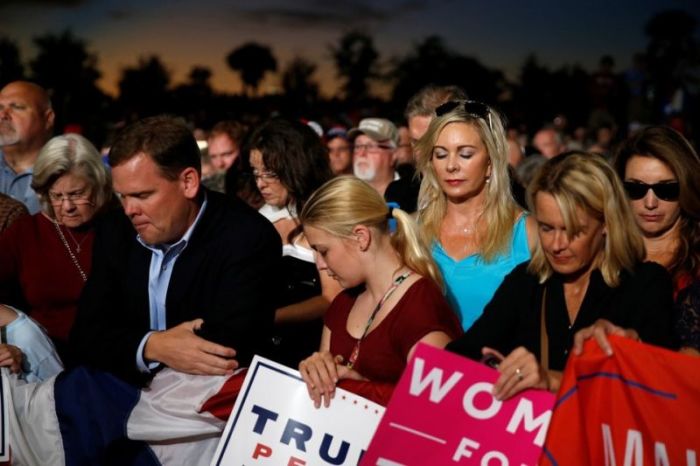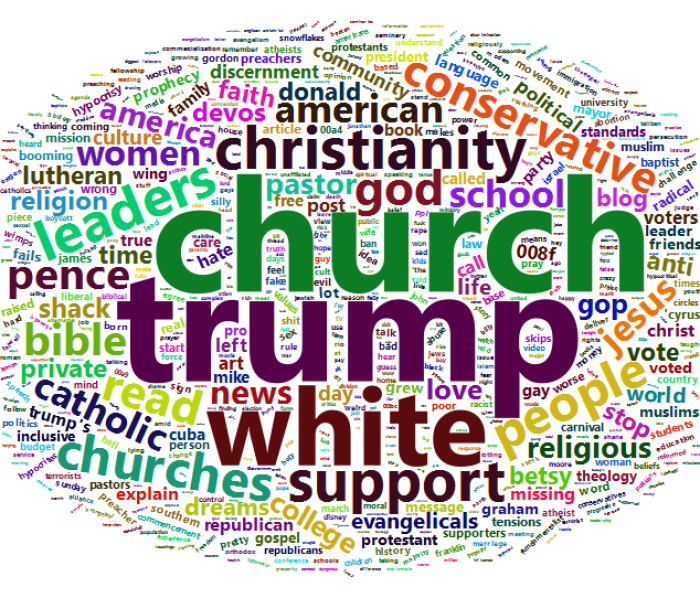What Twitter Thinks About Evangelicals

Considering that the term "evangelical" means something different to different people, one scholar who studies the intersection between religiosity and political behavior has released an analysis showing how the word "evangelical" is being used by people on Twitter.
Dr. Ryan P. Burge, a political scientist and instructor at Eastern Illinois University who has extensively researched and written on the political behavior of evangelicals and other Christians, posted the new analysis in a blog post published Monday, saying that many academics worry about their definition of a concept being "foreign" to the average citizen and lacking "street validity."
Because the term "evangelical" has a different definition depending on the survey or research poll trying to measure the views or behaviors of evangelical Christians, Burge asserted that there is arguably no place better to figure out how the average person is using the word "evangelical" than Twitter.
Earlier this year, Burge used TAGS, which is a free Google Sheet platform that allows users to automatically search Twitter for a specific words over a period of time, to collect tweets that mention the word "evangelical."
Burge explained that he asked the application to search Twitter every hour for tweets including the word "evangelical."
"After an initial period of ensuring that it worked properly, I let it do its work. I actually forgot about it until I got an email saying that the spreadsheet had now reached its memory capacity and wouldn't be able to archive any more data," Burge wrote on Religion in Public.
From Feb. 23 until April 1, the TAGS application collected 55,020 unique tweets with 189,417 total words and 22,551 unique words.
"It provides an interesting snapshot of how people talk about evangelicals on the internet," Burge wrote.
Burge initially organized the results into a wordcloud and found that one of the unique words (non-stop words) most frequently associated with "evangelical" when used on Twitter that is not "Christianity" or "Christian" is "Trump."

"If anything, that indicates that observers of evangelicalism see it as a largely political movement, especially in light of the election of [President] Donald Trump," Burge wrote. "What is also worth pointing out is the word 'white' is the fifth most used in the dataset. Those who are studying the increasing multiculturalism in evangelical Christianity would be wise to note that the average tweeter likely sees 'evangelicalism' and 'white' as closely linked."
The average person's association of "evangelicalism" and "white" is a trend that Burge noted in an interview with The Christian Post in March when he stated that "there is a huge debate about what an evangelical is and I think that when we think evangelical, generally, it needs to be white evangelical."
Burge also used a chart to show which words are most frequently paired with "evangelical" on Twitter in order to get a better understanding of the context of how the word is used.
"There are the obvious pairs of 'evangelical Christian' and all its variations, of course. But, there are some interesting results here too," Burge explained. "'Private evangelical' appears right above 'Betsy DeVos' and obviously those are related items. DeVos was widely criticized as a potential nominee for Secretary of Education because of her prior statements in supporting private Christian education. So, this Twitter archive provides an interesting snapshot of how fights over religion in public life were occurring in the months of February and March."
Burge also examined what websites are most commonly linked in tweets consisting of the word "evangelical" in order to "understand if evangelical users were trying to publicize evangelical sources or if evangelical critics were engaging in the most chatter."
Burge found that the left-leaning news site HuffingtonPost.com was the most linked website in tweets including the term "evangelical," followed by the website DeathAndTaxes.com, WashingtonPost.com, JohnPavlovitz.com, USAToday.com and TheGuardian.com.
"It's obvious from this list that it's the latter," Burge wrote, indicating that it is the critics of evangelicals "engaging the most chatter" about evangelicals on Twitter.
"The most linked websites are the Huffington Post and the op-ed site Death and Taxes. Neither of these are run by evangelicals. There are several newspaper sites, like USA Today and the Washington Post. But there are some evangelical sources, most notably Albert Mohler's website, Christianity Today, and The Gospel Coalition," he added. "It would appear, from these data at least, that the general media uses the term more than the Christian media does."
Burge hypothesized that it could be because newspaper reporters believe that the public has a good understanding of the word "evangelical," while those who work for evangelical publications don't think that the general audience has a great understanding of evangelicals.
In conclusion, Burge stated that the data shows that the term "evangelical" is "closely linked to American politics" and mostly used by non-evangelicals.
"It seems that the religious identity of the movement has become so closely meshed with its political component that they are seen as one in the same by those most vocal on social media. This is a worrisome trend insofar as it may make non-white evangelicals, or evangelicals who voted for Hillary Clinton, marginalized members of their own religious community," Burge argued. "One wonders if these individuals can create a separate identify for themselves going forward or will they always be painted with the broad of brush of 'evangelical.' What might be of larger concern to social scientists is that evangelicals completely abandon the term, and the measures that we have relied on for decades will lose their validity. Continuing to reassess our priors should be a constant task of social inquiry."




























